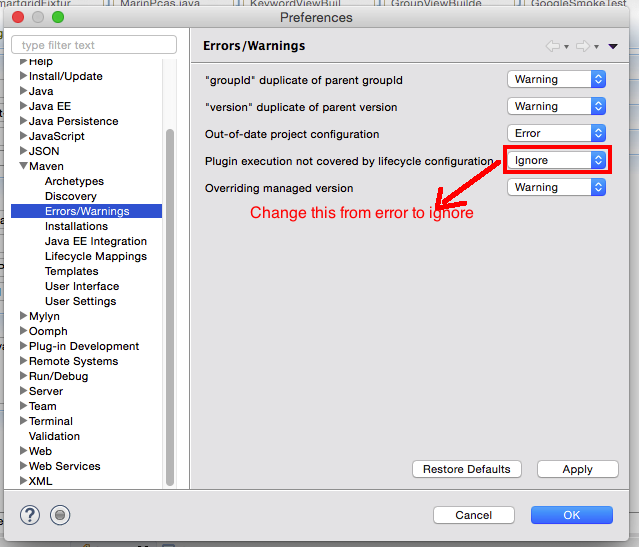I am trying to work with Spring Data and Neo4j. I started by trying to follow this guide linked to by the main site. In particular I based my pom.xml off of the "Hello, World!" example file. Here is a snip from my pom.xml for the plugin that is causing the issues...
<plugin>
<!-- Required to resolve aspectj-enhanced class features -->
<groupId>org.codehaus.mojo</groupId>
<artifactId>aspectj-maven-plugin</artifactId>
<version>1.0</version>
<configuration>
<outxml>true</outxml>
<aspectLibraries>
<aspectLibrary>
<groupId>org.springframework</groupId>
<artifactId>spring-aspects</artifactId>
</aspectLibrary>
<aspectLibrary>
<groupId>org.springframework.data</groupId>
<artifactId>spring-data-neo4j</artifactId>
</aspectLibrary>
</aspectLibraries>
<source>1.6</source>
<target>1.6</target>
</configuration>
<executions>
<!-- ERROR HERE IN ECLIPSE SEE BELOW FOR FULL MESSAGE -->
<execution>
<goals>
<goal>compile</goal>
<goal>test-compile</goal>
</goals>
</execution>
</executions>
<dependencies>
<dependency>
<groupId>org.aspectj</groupId>
<artifactId>aspectjrt</artifactId>
<version>${aspectj.version}</version>
</dependency>
<dependency>
<groupId>org.aspectj</groupId>
<artifactId>aspectjtools</artifactId>
<version>${aspectj.version}</version>
</dependency>
</dependencies>
</plugin>
The error I am seeing is:
Multiple annotations found at this line:
- Plugin execution not covered by lifecycle configuration: org.codehaus.mojo:aspectj-maven-plugin:1.0:compile (execution: default, phase: process-classes)
- Plugin execution not covered by lifecycle configuration: org.codehaus.mojo:aspectj-maven-plugin:1.0:test-compile (execution: default, phase: process-classes)
I am running Eclipse 3.6.2 and m2e 0.13. I'm not a Maven expert, so please be very explanatory in your answers if possible.
I've also tried m2e 1.0.0 via this update site and still get the same error.


